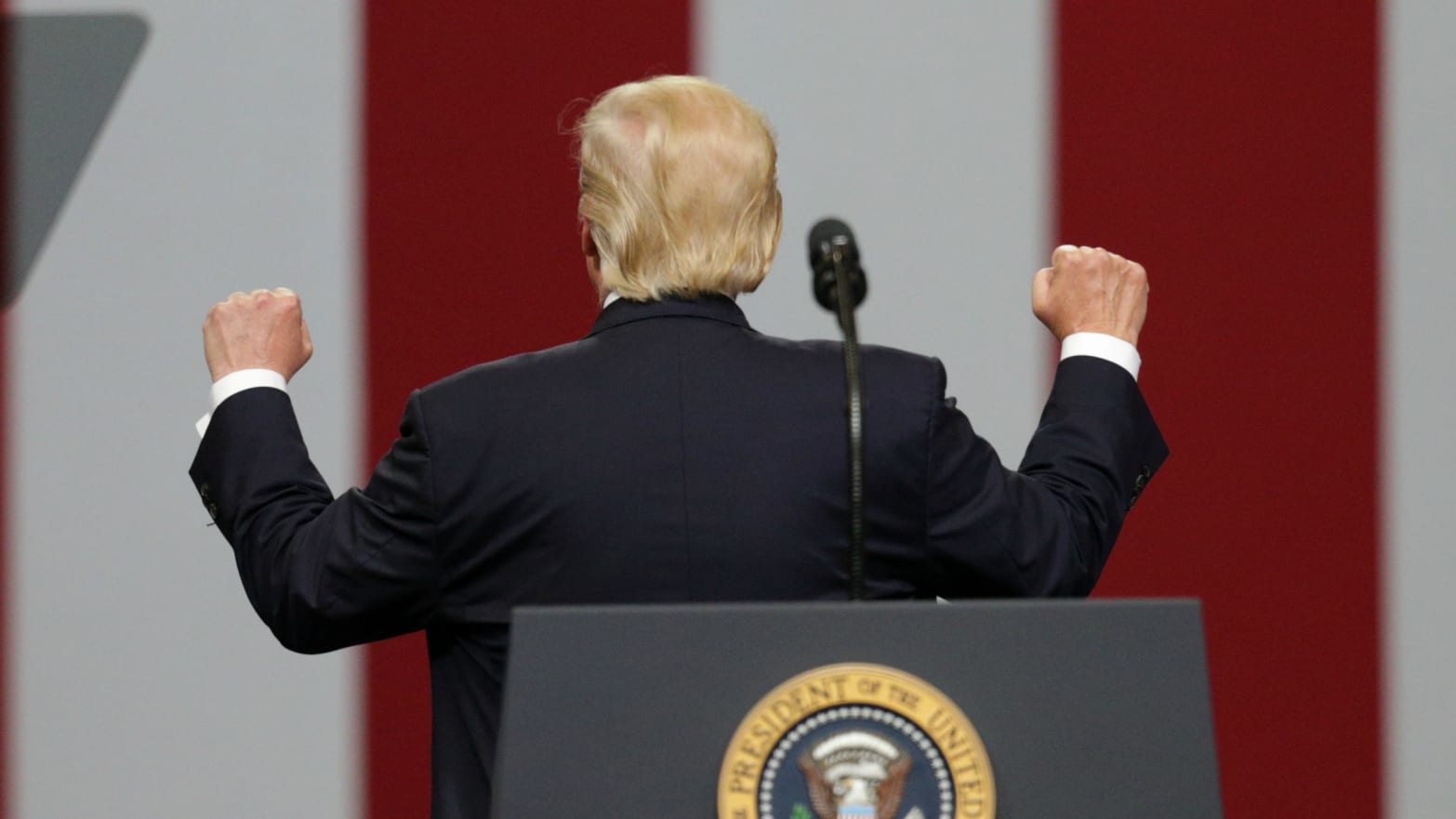As a dam cracked in Puerto Rico, spreading fear across an already devastated island, Donald Trump was in Alabama, calling a black former NFL player a “son-of-a-bitch.”
During a 90-minute rant that veered from incoherence to the raw belligerence we’ve come to know in the Age of Trump, the madman who is president went after sidelined NFL quarterback Collin Kaepernick without calling him by name.
“Wouldn’t you love to see one of these NFL owners, when somebody disrespects our flag, to say, ‘get that son of a bitch off the field right now,” Trump growled to wild cheers from the all-white crowd. “He is fired. He’s fired!'”
“You know some owner’s going to do that,” Trump’s little mouth grinned. “He’s going to say, `That guy who disrespects our flag, he’s fired!‘ ”
The fissure in the earthen structure holding back the Guajataca River threatened to put 70,000 souls in the path of 11 billion gallons of water flowing through Northwestern Puerto Rico to the ocean. While officials on the island rushed to evacuate and save lives, the president of the United States was rambling about “Rocket Man,” his nickname for his erratic counterpart in North Korea, and reveling in guttural chants of “lock her up!” – referring to his vanquished opponent in the presidential race that concluded ten long months ago. He waved his little hands around in absolute delight, telling his screaming Alabama fans they’d have to “ask Jeff Sessions about that.” He said Republicans in congress don’t have the “guts” to repeal Obamacare and leave 30 million Americans without healthcare.
Meanwhile, in Hurricane Maria’s wake, 3.5 million Puerto Ricans face months without power. The island, already reeling from a debt crisis, is awash in despair.
“San Germán,” says a friend at work, as I scroll through my phone trying to find updated news about the town where his mother lives. He has been unable to reach her and doesn’t know if she’s ok; if she got out of her house. Another co-worker has been unable to reach her family members either, on an island with no phone lines and almost no power.
Maria – the most powerful storm to hit the Caribbean in a century – devastated the island’s infrastructure. It tore apart homes and emptied Biblical torrents of rain onto the American territory, and the rain hasn’t stopped. It was the second punch after Hurricane Irma all-but wiped away the civilization that once stood on the island of Barbuda, and slammed into the U.S. Virgin Islands with catastrophic force.
They followed Hurricane Harvey, which laid waste to Houston, Texas, unearthing noxious (and by Texan government design, anonymous) chemicals that soaked working class black neighborhoods that many fear returning to, though they likely have no choice.
Trump visited Texas, making a petting zoo out of black evacuees and writing his name on a wall. He vowed to visit Puerto Rico, too. He called the governor. But mostly, he focused on his preening, and stage stalking in Alabama, where the contest to replace his attorney general in the U.S. Senate gave him a chance to do the thing he loves most: be Donald Trump.
In Mexico, earthquakes killed 295 people and counting, as that country was forced to rescind pledges of aid to Texas after Harvey.
Last week, Donald Trump said he couldn’t get a phone signal to reach the president of Mexico right away to offer his condolences. In Alabama, he said he’s still building his wall.
“And by the way folks, in case you’re curious?” he added for flourish, between meandering stories about Luther Strange, the man he was ostensibly there to support, “No, Russia did not help me.”
Imagine the spectacle – the hue and cry on right wing media including Fox News, and in the white nationalist fever swamps of Breitbart, had then-President Obama ignored the suffering in Joplin, Missouri after a tornado ripped that small Midwestern town apart in 2011, and instead held a rally in front of almost exclusively black and brown fans, who whooped and chanted his campaign slogan (though that would have been “yes we can!” … not “lock her up!”)
Seven days after that Sunday storm, which killed 158 and left more than 1,000 injured, destroying a third of the town, President Obama went to Joplin to offer comfort, and to speak at a memorial to the dead.
“The question that weighs on us at a time like this is: Why? Why our town?,” the president said. “Why our home? Why my son, or husband, or wife, or sister, or friend? Why?”
“We do not have the capacity to answer,” Obama said. “We can’t know when a terrible storm will strike, or where, or the severity of the devastation that it may cause. We can’t know why we’re tested with the loss of a loved one, or the loss of a home where we’ve lived a lifetime. These things are beyond our power to control. But that does not mean we are powerless in the face of adversity. How we respond when the storm strikes is up to us. How we live in the aftermath of tragedy and heartache, that’s within our control. And it’s in these moments, through our actions, that we often see the glimpse of what makes life worth living in the first place.”
George W. Bush was condemned for flying over New Orleans and peering at Hurricane Katrina’s mass destruction, and for sending an equestrian to do the job of a FEMA director. How he responded to the storm was up to him, and in the eyes of many Americans, he failed.
At a telethon to raise money for the victims, and to help bury the dead, a visibly nervous Kanye West, a rapper normally filled with bravado, delivered the gut punch that Bush later called the worst moment of his presidency, saying direct to camera: “George Bush … does not care … about black people.”
How will history remember Donald Trump’s response to the serial natural disasters that flattened U.S. territories and hemispheric friends in the Caribbean? How will it record a president who with his party dismisses climate change as a hoax, whose sympathies come by tweet, and who spends the days of devastation for American territories largely populated by black and brown citizens, preening in Alabama?

